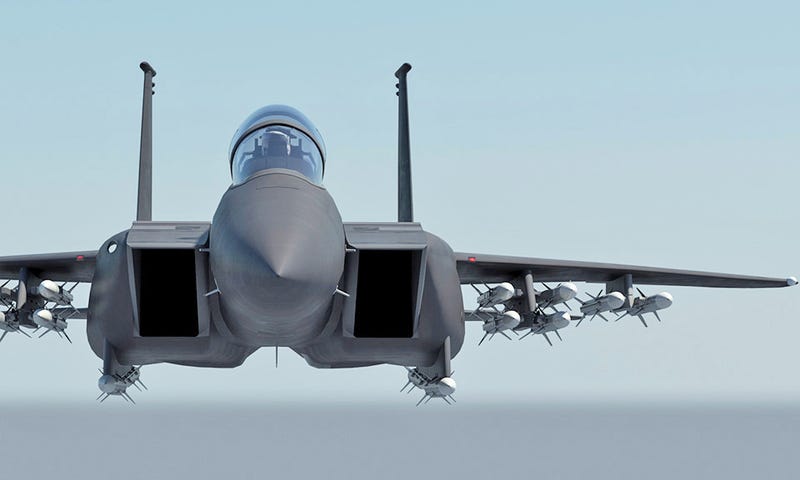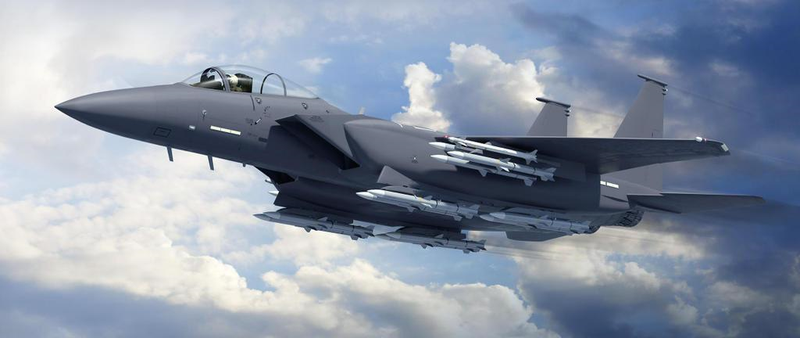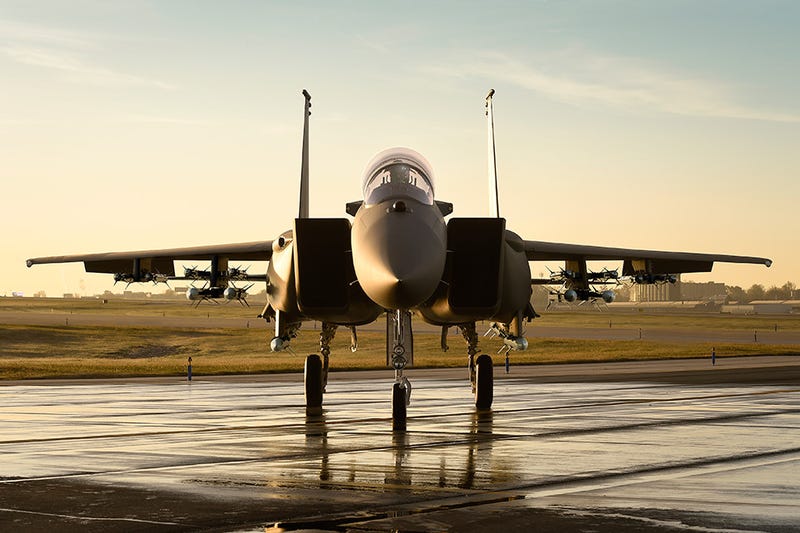
Posted on 09/13/2015 3:54:08 AM PDT by sukhoi-30mki

The annual Air Force Association conference will kick off outside of Washington next week, where Boeing is putting its latest and greatest combat aircraft developments on show for industry and Washington power brokers. This includes new F-15 configurations that allow the 43-year-old design to lug 16 air-to-air missiles into combat instead of the standard eight it carries today.

According to Boeing artwork floating around the net, this includes the activation of the number one and number nine weapon stations on the outer wings, or possibly by hefting a multiple ejector rack capable of carrying a pair of AIM-120 AMRAAMs on the Strike Eagle’s conformal fuel tanks. It’s speculated that some modifications have been made to the Eagle’s existing conformal fuel tank design to make this possible. Additionally, a new pylon for the Eagle’s standard wing hardpoints capable of carrying four missiles instead of two looks to be a key part of the concept.

Like the F-15 Silent Eagle concept and its various sub-options that have yet to find any buyers, this new Eagle offering may not be exclusive to new-build aircraft alone and could be able to be applied to various Eagle variants to varying degrees, depending on the operator’s needs. Conformal fuel tanks can even be fitted to existing F-15C/Ds, so this type of modification may not be limited to the F-15 Strike Eagle series alone.
More air-to-air missiles is a good thing for the Eagle. As the the new AIM-120D AMRAAM comes on line and is paired along with the F-15C/D’s APG-63V3 and F-15E’s APG-82 Active Electronically Scanned Array radars, the Eagle will be able to sling missiles from about double the range they can today, depending on the engagement situation. More missiles means more tactical options when facing a robust foe, and it also means the Eagle may be able to work as an arsenal ship of sorts for stealthy F-35s and F-22s which have far less beyond-visual-range missile carrying capabilities. By using the F-35 and F-22’s data collected forward of an Eagle’s position, along with the Eagle’s greatly enhanced radar data, the F-15 could provide missiles on demand from many dozens of miles away. This would also allow F-35s and F-22s to work as battle managers of sorts well ahead of the Eagle’s position even after their weapons bays are empty.

To a certain extent, some of the features seen in these new conceptual drawings exist on the ultimate Strike Eagle derivative ever built, Saudi Arabia’s F-15SA, an enhanced version of which is being marketed by Boeing as the -F-15 Eagle Advanced.
Without a doubt, the F-15 Eagle Advanced packs an incredibly potent slew of diverse sensors and has has an awesome array of configuration options, but the question is: will anyone buy into it? With the F-35 sweeping up orders around the globe, helped by strong backing by the U.S. Government, the F-15 Eagle Advanced, even with its proven hard-striking pedigree and the F-15’s unbeaten air-to-air record, will be a hard sell.
In so many ways, the latest F-15 variants outperform the F-35A, but it lacks a tailor-made stealthy skin. It is with these hurdles in mind that Boeing is fighting to keep the Eagle production line open. As of now, the Saudi order is the only one left on the books for the F-15, which will run through the end of the decade. After that order is fulfilled, unless another one is placed, the last Eagle will have already have flown.
This, along with the Super Hornet’s own production line mortality, could very well put Boeing in a position where they have no tactical fixed-wing aircraft in production. The hopes of winning the upcoming competition for a new USAF advanced trainer under the T-X program could remedy this problem, although Boeing faces tough competition.
With the stakes so high, Boeing will have a mockup of their T-X entrant displayed in a custom-built trailer at the Air Force Association conference. Only high-ranking invited guests will be able to see it; no cameras allowed.
The idea that the U.S. could have only one fighter aircraft in production going into the next decade is uncomfortable. Considering what the Pentagon does just to keep two shipyards building two variations of the same somewhat inconsequential ship, the Littoral Combat Ship, you’d think it would be smart to keep more than the F-35 line hot, at least until that weapon system is proven reliable and effective.
As for upgrades, the USAF alone will have 178 F-15C/D “Golden Eagles” in service for decades to come. It is hoped that these aircraft will continue to be upgraded over time. The wish list now includes an infrared search and track sensor and a new glass cockpit, as well as a new digital electronic warfare and radar warning suite. These are all important features, but adding another four, or even eight missiles to the Golden Eagle’s quiver may be money very well spent, and foreign Eagle operators could also follow suit.
Regardless of the iconic Eagle’s ability to continue selling on what looks to be an increasingly fickle fighter market of the future, it will be around for a long, long time come. Although the more exotic Silent Eagle concept never caught on, these less ambitious, but totally logical enhancements hopefully will.
Image credits: Conceptual Renders/Boeing, photos Author
Sixteen AMRAAMs is pretty scary load out.
On the other hand, the missiles might not be available:
Since 2007 Raytheon has continued to slip on AMRAAM deliveries, leading the USAF to withhold $621 million in 2012 on account of 193 missiles not delivered.
Well it looks like the F35 is a rehash of the F111 of McNamara fame—so it looks like we will need all the missiles we can cram on a jet.
Too bad the ‘35 is vacuuming up all that cash as well. More planes is better planes when it comes to the real world and assault by ANY capable enemy. We haven’t had one of THOSE in decades.
Quantity has a quality all its own in combat.
What a beast!
The AMRAAM is such an amazing missile that anything with the right electronics to support them can probably dominate its local airspace - until it runs out of AMRAAMs.
The F-35 was a silly idea. We don’t need a few extremely expensive and very limited strike fighters. We need hordes of COIN aircraft with good sensors, moderate weapon loads, long loiter times and high availability. Frankly, we need armed and armored crop dusters.
Sounds like the A-10.
But those aren't go fast, slick looking pilot ego boosters.

16 AMRAAMs will mess up anyone’s day. It’s amazing that after 4 decades the Eagle continues to grow. It’s potency as a platform is simply amazing.
“Frankly, we need armed and armored crop dusters.”
That’s my view too. We are mostly dealing with ISIS and Iranian forces, where you need low and slow meat grinders. Shoulda bought more F22s to clear the airspace, ditched the F35 (except maybe the Harrier version) and upgraded the A10.
Key quote: “In so many ways, the latest F-15 variants outperform the F-35A”
The F-15SE is a design that could put the 35 in the waste bin of history where the crappy airplane belongs and at a much lower cost. The stupid program has so much money sunk into it they can’t let go. It is another McNamara type debacle. Even the F-111 found a place but never as intended and never in the numbers planned. It was merely a salvage operation for a very bad plan.
Too big. Too expensive. We need LOTS of ‘em. And they need to be able to work at night.
Something like the AT-802U by Air Tractor.
Relatively cheap, easy to keep flying, good loiter time.
Disclaimer: Opinions posted on Free Republic are those of the individual posters and do not necessarily represent the opinion of Free Republic or its management. All materials posted herein are protected by copyright law and the exemption for fair use of copyrighted works.